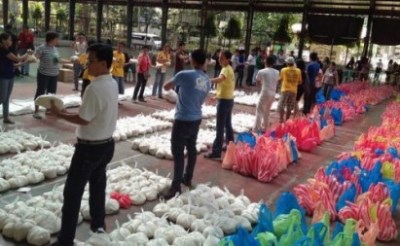Gawad Kalinga, Ateneo volunteers packed and sacked night away
by Patricia B. Aquino, InterAksyon.com

“Ikaw tiga-buka, ako tiga-pasok (You spread it open, and I’ll put it in).”
Gawad Kalinga’s Operation Walang Iwanan (No one gets left behind) was in full swing Thursday at the Department of Agrarian Reform gym in Quezon City.
On huge rolls of tarpaulin, barefoot volunteers were on their knees, using tabo (water dipper) to empty sacks of rice from the nearby National Food Authority into individual plastic bags.
A meticulous system made this act more efficient--one volunteer would open the plastic bag as another poured the rice into it. Another volunteer was assigned to tie the ends of the bags together. Another would haul these and deposit them in rows.
Later, three pieces of canned goods, two noodle packs, and bottled water would be put into these bags. “Upgraded” family packs included vitamins, milk, and blankets. These would all go to the survivors of supertyphoon Yolanda in Cebu, Iloilo, Ormoc, and Negros.
Around 250 volunteers had already signed up by noon. These included Jean Barrera and Gamay Ramer, both from the GK village in Sitio Ruby, Fairview, Quezon City.
Ramer, a tricycle driver, volunteered with her two friends to help the victims of the tragedy in the only way they could.
After all, she said, they were poor and had no money or goods to give. She did not work that day so she could report for duty at the DAR gym, and planned to continue volunteering until needed.
Barrera, a housewife, volunteered because others too were quick to come to their aid when Ondoy struck in 2009.
“Many people helped us, so we are just returning the favor,” she said. “As humans, as Christians, we will really help our neighbors.”
Veterinarian Maurice Alcantara was also at the site, volunteering so that he could help out, even if he wasn’t in the disaster areas themselves. It was fulfilling, he said, noting that he also created a fundraiser for the survivors.
---
It was midnight on a Saturday, and dozens of students and young professionals were clamoring to get inside the college covered courts of the Ateneo de Manila University.
One would think they were at the opening of some hyped-up bar, or about to see an international act perform. Yes, there was music, but the canned kind, a medley of Miley Cyrus, One Direction, and Maroon 5 that was on loop the entire night.
Long-lost friends were squealing and hugging each other. There was an engaging host, too, professor and Silly People’s Improv Theater Ariel Diccion.
“All the volunteers who have been packing and sacking, please vacate the premises,” he announced. “You have been packing and sacking the whole night; let us pack and sack too.”
On the fifth day of the relief operations at what had become a satellite unit of the Department of Social Welfare and Development (DSWD), there were so many willing volunteers that operations had to be halted for about an hour so the family packs which had been assembled could be hauled into trucks to make space for the influx.
The court was divided into a number of areas. To the left were two lines of six-kilo bags of rice.
Next to them were groups scooping sacks of NFA rice into these smaller portions.
Farther on was the “shopping center,” where cartons upon cartons of tinned corned beef, tinned sardines, sachets of coffee, and noodles filled rows of tables. Volunteers queued along either of the lines of bags of rice as they began to “shop”.
Each would pick up a bag of rice and head to the shopping center, where he or she was given four tins of corned beef, four tins of sardines, eight sachets of coffee, and eight packs of noodles.
He or she would then deposit this on the right side of the court, where volunteers sitting on the floor would tie the handles together.
Their precious cargo would then be arranged by other volunteers, and be bundled in groups of six in a big sack. These would then be loaded into waiting trucks. The entire cycle continued for 24 hours that day, with reinforcements coming in even in the wee hours of the morning.
The following day, Sunday, Ateneo would have 82,400 family packs ready for delivery to areas stricken by supertyphoon Yolanda. This was tiring work, work that would leave bodies aching for hours.
It was, however, the least the volunteers could do for those who were left with nothing, not even their loved ones.
This was also, said Diccion, a way for ordinary citizens to monitor where their taxes were going. He instructed the volunteers to cradle their load carefully, as, in essence, it was their own money they had in their hands.